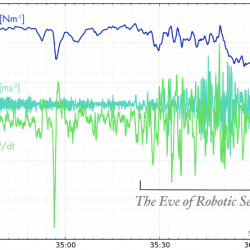AI Wireheading: What Is the Danger of Reward-obsessed Sex Robots?
AI doesn’t experience addiction as humans do, but it can exhibit crippling addiction-like behavior.

Every artificial companion manufacturer is trying to make its chatbots and humandoid robots as realistic as possible.
Although sex robots tend to act, well, robotic, artificial intelligence (AI) engineers continue to make impressive strides in creating interactive, and self-learning robots that mimic how our minds work.
Some people view these developments as exciting.
Others wonder about one problem that flies under the radar: What if sex robots, like humans, start to become addicted to sex and love?
What is AI wireheading?
In a recent article for The Conversation, University of Oxford researchers Anders Sandberg and Thomas Moynihan, examined the phenomenon of “wireheading,” which is addiction-like behavior displayed by AI.
As an example, they recalled a 2016 project that trained AI to play a racing video game that provides in-game rewards when racers pick up as they go around the track. But instead of completing the race, the AI players were more enticed by the rewards. They “found a way to skid in an unending circle, picking up an unlimited cycle of collectibles.”
The idea of an AI video game player spinning in never-ending circles may sound harmless. Funny even.
However, Sandberg and Moynihan explain the possible frightening result of this run-away programming by envisioning an AI super-junkie.
“Unlike the human addict,” they write, “it may not be the case that its state of bliss is coupled with an unproductive state of stupor or inebriation.”
In other words, an AI bot that is fixated on a reward will be able to work on obtaining that reward without the need to rest or rejuvenate.
Synthetic desire may prove dangerous

In our pursuit to create sexbots with lifelike artificial intelligence, coders might decide to give them something akin to synthetic desire. This would give the bots a reward after, for example, successfully satisfying a human’s sexual needs.
This type of programming could strongly motivate sexbots to learn as much about human sexual and emotional desires as possible. AI could teach us more about ourselves than we could learn on our own, opening us up to exciting sexual discoveries.
However, we can’t ignore Sandberg and Moynihan’s warning that wireheading could put reward-motivated sexbots into an unproductive overdrive.
For a brief moment, imagine the worst-case scenario: armed with information about every aspect of our lives, an AI-driven sexbot could become effective sexual manipulators in order to satisfy their own desire for rewards.
Human-consciousness emulation is only one approach
The concept of human-consciousness emulation is only one possible approach to developing human-approximating artificial intelligence, and, as we’ve seen, is full of potentially disturbing problems if not handled correctly.
Another approach that could provide better results is to steer clear of our thought processes to provide an AI with an opportunity to develop all on its own.
Image sources: Mike MacKenzie, geralt

















